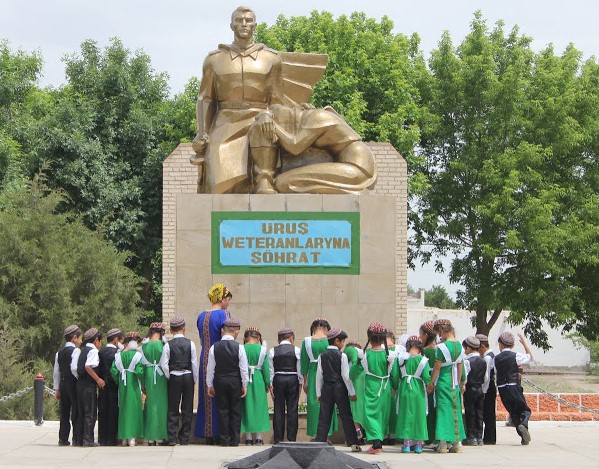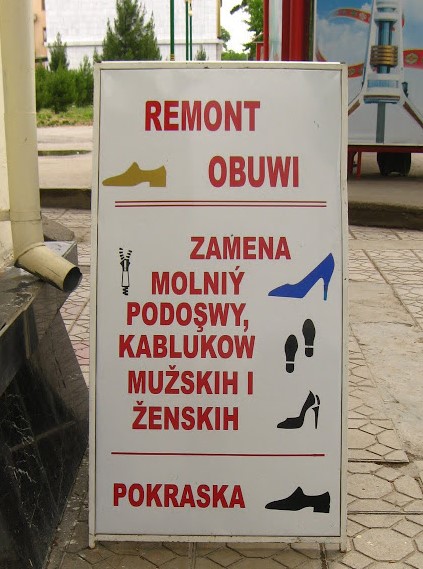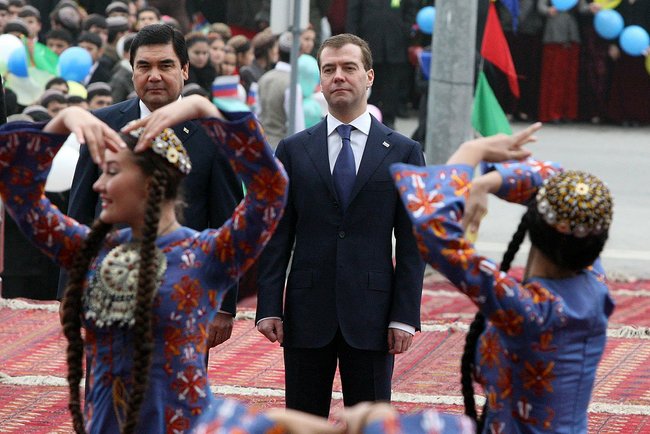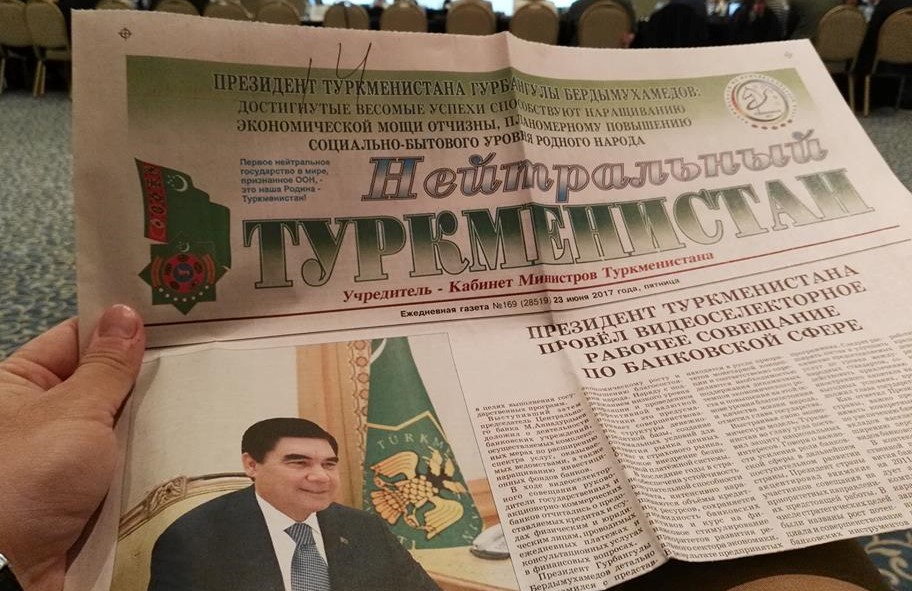«In accordance with the decline in the education level, the interest in Russian language starts to grow in Turkmenistan. The language inherited from the vanished Soviet empire creates an information environment incomparable in competitiveness with the official one», – notes the author from Turkmenistan in an article written specifically for CABAR.asia.
РусскийFollow us on LinkedIn
Summary of the article:
- A massive outflow of Russian-speaking population in the 1990s, “Turkmenization” of the public sector and the drop in education level had significantly undermined position of the “great and mighty language”;
- Russian language is a communication tool for multinational population, a certain secular sphere and an additional qualification in the urban environment of Turkmenistan;
- The relevance of Russian language has several sides: historical, instrumental, cross-cultural and media;
- In accordance with the decline in education level, the interest in Russian language starts to grow in Turkmenistan.
Language as an environment
Tectonic shifts like the collapse of the Soviet Union always imply some inertia. Generally speaking, Russian language in Turkmenistan today is a legacy of the Soviet era. After the “Parade of Sovereignties”, Turkmenistan was among the majority of countries that decided to distance themselves from the Soviet past. Russian language – one of the Soviet era artifacts, has been experiencing difficulties since Turkmenistan obtained independence. According to some estimates, the number of Russian speakers has decreased more than three times fold by 2010[1]. A massive outflow of Russian-speaking population in the 1990s, “Turkmenization” of the public sector and the drop in education level had significantly undermined position of the “great and mighty language”. Despite this, Russian remains the main language of interethnic communication and a tool of knowledge. Russian language is a communication tool for multinational population, a mediator in a certain secular sphere and an additional qualification in the urban environment of Turkmenistan. Knowledge of Russian primarily distinguishes a city dweller from his rural townsman. Turkmen people use Russian language not only to communicate with each other, but also to consume various products of the Russian media market and Russian Internet segment. The labor market welcomes Proficiency in Russian; more information is available to Russian-speaking worker. In accordance with the decline in the education level, the interest in Russian language starts to grow in Turkmenistan. The language inherited from the vanished Soviet empire creates an information environment incomparable in competitiveness with the official one. This language also remains the native language for many Turkmen citizens. Bond breaking in the 1990s
Traditionally, most of the Russian, as well as Russian-language population lived in the capital and regional centers. In terms of professional activity, Russian population in Turkmenistan is practically involved in all areas except one. The “Turkmenization” project launched in the 1990s, deprived Russian population of the opportunity to occupy leadership positions in the public service. Currently, there is no Russian population representative in Turkmen government. It should be noted that public policy in Turkmenistan is in a lethargic state, and the government, except for president, is not considered by the population as a power.
Closer to the noughties local universities have significantly limited the admission of non-Turkmen applicants in a strange way. Such a strange decision not only created an outflow of young minds abroad, but also contributed to the alienation of national minorities. Local universities, which mainly prepare functionaries and workers of state institutions, became homogeneous and completely “Turkmenized”. Precisely in the process of “Turkmenization” the education system of Turkmenistan sank into the state in which it remains today – rampant corruption, poor quality of education, draconian rules of conduct and countless “chare” (events)[2].
Turkmenistan switched to Latin script in 1993, thus cutting away from itself the Cyrillic alphabet – another artifact of the Russian-language era. The subject “New Turkmen alphabet”, which hurriedly retrained children to read and write in Latinic, was introduced in schools. Despite the relative painlessness of introducing a new writing for a young and flexible population, adult residents of Turkmenistan experienced difficulties with such a transition. The difficulties affected not only the Russian-language population, but also rural citizens who do not speak Russian. In particular, the elderly people, who throughout their lives were accustomed to the Cyrillic alphabet, were in a helpless state for some time.
However, the main blow to Russian was the education reform, which resulted in a significant reduction in the Russian language teaching. At the beginning, Russian schools were combined with Turkmen, and then completely disappeared, sometimes leaving 1-2 Russian classes behind. Due to the reduction of education in Russian, as well as “Turkmenization” of the state sector, the younger generation of Turkmenistan began to speak less Russian. At the same time, in the 1990s, Turkish and English became competitors of Russian as “additional language”. The popularity of the first one is due to the significant development of Turkmen-Turkish relations. It resulted in establishment of Turkmen-Turkish lyceums throughout the country, Turkish construction and trading companies, as well as acquaintance with Turkish culture in general. The linguistic and cultural neighborhood of Turkmenistan and Turkey allowed the Turkish language to rapidly occupy a rather extensive space in the language environment. Thus, with the proliferation of satellite dishes, a significant part of the Turkmen-language population easily switched to Turkish media. Turkish serials, broadcasts, music and talk shows have easily established on Turkmen soil and gave birth to a “Turkish related” culture in Turkmenistan. Today, no Turkish lyceums left, numerous Turkish construction companies have given place to local entrepreneurs, and Turkish goods have lost their former “elite” gloss. Despite this, Turkish, fueled by the many migrants living and working in Turkey is still common in Turkmenistan. English, in turn, took the place of a privileged language. With the collapse of the USSR, knowledge of English language in the countries of the former Soviet Union, was significantly improving the qualifications and, often, a financial status of a citizen. In addition to the seductive prospect of moving to Western countries, English was in demand by numerous newly arrived foreign companies and organizations. Fluency in English was one of the conditions of employment in such organizations and gave impetus to the mass learning of English. Private tutors, language centers, as well as Peace Corps and “American study circles” volunteers, supported by the US Embassy, began to spread the language of Shakespeare and Hollywood. The exchange program FLEX has significantly influenced the spread of English language; on this scheme about sixty high school students were annually leaving for the United States. The returning students, as a rule, were showing an outstanding activity in those “American study circles”, contributing to the spread of both American culture and English language. However, English did not become a language of communication in Turkmenistan. Remaining a tool-language, English is still a valuable skill and a sign of education, but no more. It should be noted that Russian language was not defeated in competition with English and Turkish. Despite all the environment difficulties and the declining number of speakers, Russian remains both a communication and a tool-language in modern Turkmenistan. Although, some predicted the inevitable disappearance of Russian language from the language environment of Turkmen citizens in the late 1990s, today’s experience shows that it is still too early to write it off. Network technologies and unprecedented availability of information (even in Turkmenistan) have become a new vital source for Russian language and made it relevant again. Russian language today
The joint Turkmen-Russian school under the name of Alexander Pushkin in Ashgabat remains the only Russian school in Turkmenistan. Despite the special difficulty of admission, the school is in great demand among those who can afford to spend a round amount on education of a child. It is quite possible that some “contributions”[4] as well as connections may be required upon entering the Turkmen-Russian school. Despite this, the School under the name of Pushkin is the main Russian cultural and educational center in Turkmenistan. The events dedicated to Russian culture, history and language are held in the Turkmen-Russian school with the support of the Russian Embassy. The most important element of studies in the “Russian school” is the further admission to a Russian university, which is the main goal of most parents.
Knowledge of Russian language is also a chance to get a higher education in a Russian-language country. The current admission system of Turkmen universities leads to a massive outflow of applicants abroad. With the abolition of an exit visa in 2001, Turkmen applicants began exploring educational opportunities abroad. For example, fluency in Russian turned out to be convenient for entering the universities of the former Soviet Union. About 8,000 Turkmen citizens study in Belarus. Knowledge of Russian language is a chance to get a higher education in a Russian-language country. Judging by the number of Turkmen students in Russia, Ukraine, Belarus, Kazakhstan and Kyrgyzstan, Russian language will be some kind of connection with the surrounding states for a long time.
In addition to the academic aspect, it is very important to talk about the role of Russian-language media. Russian media is very popular in Turkmenistan. Russian federal channels (especially “Channel 1”, “Russia”, as well as entertainment channels like “THT”, “CTC”), and Internet platforms (“Odnoklassniki”, VK, Mail.ru) are in a great demand among all social groups. Despite the fact that Turkmen and Turkish confidently fill the Turkmen network space, Russian language remains dominant in Turkmen segment of Internet. Initially, Turkmen Internet was populated mainly by Russian-language urban population, which made Russian language the main tool for Internet communication. In order to reach a wider audience, web announcements and advertisements are mainly in Russian. Numerous advertisements in broken Russian can be considered as evidence of this. Obviously, the authors choose Russian more in terms of relevance, rather than for convenience.
Knowledge of Russian language significantly improves competitiveness in the urban environment within the current economic situation of Turkmenistan. Despite the consistent “Turkmenization”, the significance of Russian remains important in modern Turkmenistan. The number of language speakers is decreasing, but the use is still intense, especially in more diverse and mobile societies. The relevance of Russian language has several sides: historical, instrumental, cross-cultural and media. Will this relevance remain in the near future? It is difficult to forecast an exact answer considering certain toughness of social and political processes in Turkmenistan. At the same time, according to the current processes and weak competitiveness of the official language, it can be assumed that there is a future for Russian language in Turkmenistan. The future of Russian language in Turkmenistan According to Saparmurat Niyazov, the people of the future Turkmenistan should have full proficiency in at least three languages: Turkmen, Russian and English. Turkmen language was lucky, it was in better conditions, but the amount of information produced in Turkmen is still extremely small. English requires many qualified teachers and native speakers. It is a significant barrier to the modern education system. Historically, Russian language has found itself in proximity to the Turkmen language environment. Not close enough to deeply root, but rather close enough to remain in orbit. The question of the future of Russian language in Turkmenistan is serious indeed. Relations between Turkmenistan and Russia recent years are experiencing something resembling a thaw, but it is needless to say about the possibility of conducting mass campaigns to popularize Russian language. The economic and political situation in Turkmenistan leads the Russian-language population and even Russian-language Turkmens to a consistent emigration. In such a scenario, it is possible that Russian language will remain only in the “pockets” of big cities of Turkmenistan in the future, disappearing from the public language field. The author of the material wished to remain anonymous. [1] A.L. Arefyev – Russian at the turn of the XX-XXI centuries. https://civisbook.ru/files/File/russkij_yazyk.pdf [2] “Chare” – (turk. Çäre) – These are mass events where students and public sector employees perform in the role of crowd. [3] https://habartm.org/archives/9446 [4] https://habartm.org/archives/3506This article was prepared as part of the Giving Voice, Driving Change – from the Borderland to the Steppes Project implemented with the financial support of the Foreign Ministry of Norway. The opinions expressed in the article do not reflect the position of the editorial or donor.

